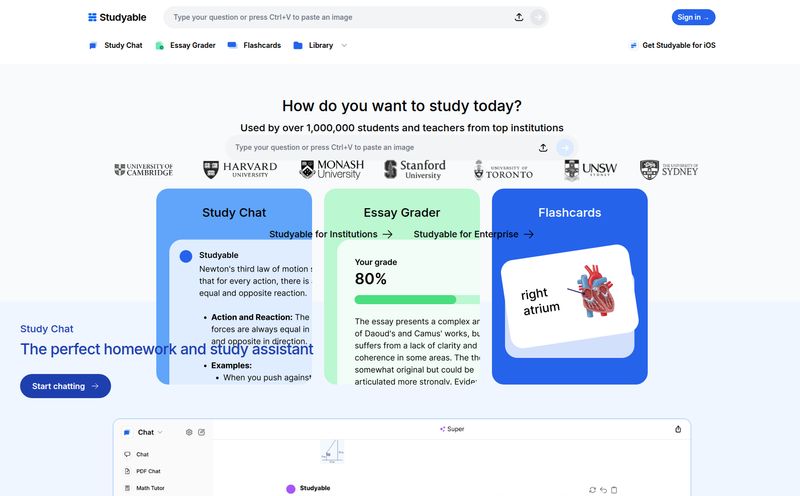I still get a cold sweat thinking about my dissertation. The blinking cursor on a blank page. The mountain of journal articles that all seemed to say the same thing, yet somehow, not the thing I needed. The frantic, caffeine-fueled nights spent wrestling with citations. Sound familiar? We’ve all been there. It’s a rite of passage for anyone in academia or research.
But what if it didn’t have to be quite so painful? In the last couple of years, AI writing tools have exploded onto the scene, promising to banish writer’s block forever. Most are for blogs, ads, or social media posts. But a few are tackling the big beast: academic writing. And one that recently crossed my desk is called 千笔写作 (Qianbi Writing), and its claims are… well, they’re bold.
The name literally translates to “Thousand Pen Writing,” which paints a pretty vivid picture. But the headline feature is what really makes you blink: it can generate a 30,000-word paper in 10 minutes.
Yeah, you read that right. Ten minutes. My entire personality was built around surviving my thesis, and this tool claims it can knock out a draft in the time it takes to make a pot of coffee. So, is it legit? Or is it too good to be true? Let’s get into it.
What Exactly is Qianbi Writing?
At its core, Qianbi Writing is an AI-powered platform designed specifically for the heavy lifting of academic and research-based writing. This isn't your average content spinner. It’s positioned as a research assistant that can help you go from zero to a full, structured draft, complete with all the academic trimmings.
Unlike some of the more generic large language models, Qianbi’s big selling point is its ability to integrate real data. We're talking charts, tables, mathematical formulas, and even code snippets pulled from real network sources. This immediately sets it apart. It’s not just inventing prose; it’s attempting to build an argument with evidence.

Visit 千笔写作
The Core Features That Caught My Eye
Look, the 30,000-word claim is wild, but it’s the features underneath that make me think this is more than just a gimmick. I’ve seen a lot of AI tools, and the specifics here are genuinely interesting.
More Than Just Words: Real Data and Visuals
This is the one. For anyone who has ever spent hours trying to format a table in Word or create a decent-looking chart from a spreadsheet, the idea of an AI doing it for you is a dream. Qianbi claims it can generate these elements and place them contextually within the paper. If it works as advertised, this transforms the tool from a simple writer into a data-synthesis assistant. It’s like having a first-year research assistant who never complains about formatting.
Building the Skeleton with AI Outline Generation
A great paper is built on a great outline. A bad one… well, it reads like a rambling mess. Qianbi offers to generate a comprehensive, three-level outline of up to 2,000 words. This is incredibly useful for breaking down a complex topic into manageable chunks. For students who struggle to structure their thoughts, this feature alone could be worth the price of admission. It gives you the bones of the paper, so you can focus on adding the meat.
The Full Academic Package: Reports, PPTs, and References
This is where Qianbi shows its understanding of the academic workflow. It doesn't just stop at the paper itself. The platform can also generate supplementary documents like opening reports, task books, and even a PowerPoint presentation. And perhaps most impressively, it claims to provide up to 40 real references. The drudgery of building a bibliography is real, so this is a massive time-saver. Of course, you absolutely have to check these sources, but as a starting point? That's powerful.
The Good, The Bad, and The AI-Generated
Alright, let's get down to the brass tacks. No tool is perfect, especially in the fast-moving world of AI. It’s all about weighing the benefits against the limitations.
The speed is obviously the main advantage. Generating a massive draft so quickly is like going from a horse-drawn carriage to a bullet train for research. It can obliterate the initial paralysis of a blank page. And with unlimited revisions, you have a safety net to tweak and regenerate sections that don't quite hit the mark.
But now for the reality check. The platform itself is refreshingly honest about its limitations, which I respect. It explicitly states two very important things:
- The generated content needs editing and refinement. This should be a given for ANY AI tool. I’ve always said that AI gives you the clay; you still have to be the sculptor. It produces a first draft, maybe even a decent one. But it lacks your unique voice, your critical perspective, and your deeper insights. You must go through it, rewrite sections, and make it your own.
- The "AIGC rate" needs to be reduced to pass plagiarism checks. This is the big one. Let's be clear: AI-generated content has a digital fingerprint. Plagiarism detectors like Turnitin are constantly being updated to spot AI writing. Qianbi knows this and is telling you upfront that if you copy and paste the output, you will get caught. This is not a cheating machine. It's an assistant.
So, the takeaway here is that you can't just slap your name on the output and turn it in. That would be both unethical and, frankly, pretty stupid.
Navigating the Ethics of AI in Academia
This brings us to the elephant in the room. Is using a tool like Qianbi Writing ethical? The answer, like most things in life, is complicated. It's a gray area that universities everywhere are still figuring out. Some have banned AI tools outright, while others are creating policies for responsible use. (I'd recommend checking your own institution's policy before you even consider using a tool like this).
In my opinion, it all comes down to intent. If you're using it to brainstorm ideas, structure your paper, find relevant data, and overcome writer's block, I see it as a legitimate tool. It's a souped-up version of using Google Scholar or a thesaurus. However, if you're using it to write the paper for you and passing off the AI's words as your own, you're crossing a serious ethical line into plagiarism.
Think of it as a collaborator, not a ghostwriter. It can do the grunt work, but the final argument, the critical analysis, and the scholarly contribution must be yours. And yours alone.
So, How Much Does This Magic Cost?
This is the million-dollar question, isn't it? As of my writing this, I couldn’t pin down a clear pricing page for Qianbi Writing. This isn't uncommon for specialized tools, especially those that might be more prominent in non-English markets. They might be operating on a quote-based system, a beta program, or simply haven't publicized their pricing model widely yet.
I would expect to see a subscription model (monthly/annually) or perhaps a pay-per-paper model. Given the intensity of the service, it's unlikely to be free. My best advice is to head to their official platform and check directly for the most current information.
Who Should Actually Use Qianbi Writing?
So, who is the ideal user for a tool this powerful but this nuanced?
- Students Drowning in Structure: If you have the ideas but struggle to organize them into a coherent academic paper, the outline generator could be a lifesaver.
- Researchers on a Deadline: Need to produce a comprehensive literature review or a data-heavy report, like, yesterday? Qianbi can give you a massive head start on compiling and structuring information.
- Non-Native Speakers: It can be a fantastic aid for phrasing complex ideas in a more fluent way, so long as the core concepts and research are entirely your own work.
It is definitely not for the student looking for a shortcut to a degree without doing the work. The tool is smart, but plagiarism checkers are smarter, and your professor's intuition is probably the smartest of all.
Final Thoughts: A Powerful Assistant, Not a Replacement
So, what's my final verdict on Qianbi Writing? I'm cautiously optimistic. The claims are massive, but the feature set is genuinely impressive and tailored to a real need. It represents a new generation of AI tools that are less about generic content and more about specialized, data-driven assistance.
It's not a magic button that writes a perfect, submittable paper. Such a thing doesn't exist, and frankly, it shouldn't. What Qianbi appears to be is an incredibly powerful research assistant that can handle the most tedious parts of academic writing—structuring, data compilation, and initial drafting—at an unbelievable speed.
If you use it wisely, as a partner in the writing process, it could fundamentally change your workflow for the better. Just remember: it's your brain, your argument, and your name on the final paper. The AI is just there to hold the pen.
Frequently Asked Questions
Can Qianbi Writing bypass plagiarism checkers?
No. In fact, the platform itself advises that the raw output will likely be flagged by AI detectors. You must heavily edit, rewrite, and infuse the text with your own original thought to pass plagiarism checks and, more importantly, to maintain academic integrity.
Is the content generated by Qianbi Writing factually accurate?
It claims to use real network data, which is a step up from many AIs that can "hallucinate" or make up facts. However, you should always verify any data, statistic, or reference it provides. Treat it as a starting point for your own verification process, not as an infallible source.
What languages does Qianbi Writing support?
Given its name, 千笔写作, the platform is certainly optimized for Chinese. It likely has strong English capabilities as well, as is common with major AI platforms, but you'll want to check their site for a full list of supported languages.
Do I still need to edit the paper from Qianbi?
Absolutely, 100%. Think of the output as a very detailed and well-researched first draft. You still need to perform the most important steps: fact-checking, adding your personal analysis and critique, refining the tone, and ensuring the entire paper flows and makes a coherent argument in your own voice.
Is using an AI tool like Qianbi for my thesis considered cheating?
This is a critical question and it depends entirely on your university's or institution's Academic Integrity Policy. Some may allow AI for brainstorming and outlining, while others may forbid it completely. Using it to write the paper for you is almost universally considered plagiarism. Always check your school's specific rules before using any AI writing assistant for graded work.
Reference and Sources
For more discussion on the role of AI in academia, you can read perspectives from educational institutions and scientific journals. A good starting point is this article from Nature: How to use ChatGPT to write a paper.
Official information on Qianbi Writing should be sought from its official website (if available).



